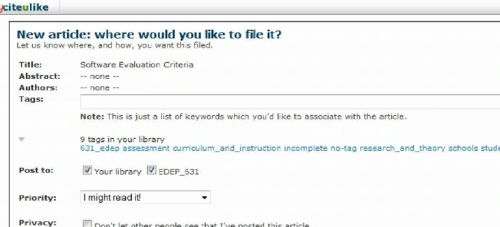
Locating information for academic purposes is already challenging, sorting the information found is another common struggle among students and academics. Availing of the internet and online search engines for sources has become increasingly popular as supported by Reiger’s (2009) study. Collecting and sorting references can be a time consuming process, CiteULike is a digital tool that helps make this process more efficient. CiteULike allows the user to store, organise and share the scholarly papers they have sourced. Citation details are extracted automatically from the users’ personal library, where the selected papers are stored. CiteULike works from within the users’ web browser, adding to the accessibility of this tool. For the purpose of this review, CiteULike will be evaluated under a set of criteria;
Sustainability: How long has the tool been available for? Is the tool widely used? Can data be exported?
Efficiency: How easy is this tool to navigate? Does the tool supply adequate information for new users? Does this tool perform as it claims to?
Contribution to Knowledge: Does this tool contribute to the efficiency of the users’ research process? Can data collected be shared with others?
Firstly, the tool will be evaluated in terms of its sustainability. CiteULike has been available as a free web service since 2004. As of 2007, there were 33,000 registered users, this number was reported to be growing at 100 users per day (Emamy & Cameron,2007). CiteUlike has accumulated a large community of users and is continuing to grow. The unique combination of a bibliographic management tool and a social bookmarking service is what makes CiteUlike so appealing. There are currently over 8 Million articles stored via CiteULike , compared to over 2 Million in 2009 (http://www.citeulike.org/).
CiteULike users and their selected articles are not confined to their web browser, the users’ personal library can be exported to their computer in various formats (ie. PDF,RTF,Plaintext). Since CiteULike is an open source tool, the content available depends on the amount of active users and the type of papers they are storing. CiteULike is evidently a very sustainable, viable tool that promotes the sharing of knowledge and has a large community of users.
Secondly, CiteULike will be evaluated in terms of its efficiency. The basic navigation and functionality of the tool is simple, step by step assistance is offered for new users. Scholarly papers can be stored instantly once the CiteULike browser button is installed. Users can organise their papers in their own personal library, which can be organised by user generated tags. These tags enable users to navigate libraries and discover new papers that have mutual tags. Users also have the option to prioritise papers of superior importance, adding to the efficiency of this tool. CiteULike also offers an alphabetical listing of journals as an alternative for users who decide not to locate their own articles.

Another addition, is the subject specific pages where the latest papers are listed according to the subject they are classified under. This enables the user to explore papers under a specified category in an efficient, easily accessible way. “Citegist” displays the most popular articles in the past seven days within CiteULike. In this way, it is easy for a user to uncover new, popular articles that may be of relevance. CiteULike is unquestionably a highly efficient tool for collecting, storing and sharing scholarly papers.
Finally, CiteULike will be evaluated in terms of its contribution to knowledge. This particular tool facilitates the sharing and consumption of academic literature (Emamy & Cameron, 2007). A function entitled “neighbours” is incorporated in CiteULike, users who have bookmarked the same articles are shown here, connections can be made between users. Researchers in similar fields can build up professional networks, thus promoting knowledge sharing.

Since every users’ bibliographic database is web based, users can browse each other’s collections. Of course this is not favourable for every individual, but gives users the opportunity to share and consume new academic information. The use of user generated tags also contributes to CiteULike’s contribution to knowledge. Users can explore academic papers under tags that interest them, which enables them to uncover articles others have collected.
In terms of CiteULike’s contribution to the efficiency of one’s research process, it succeeds in making the collecting and sorting of sources an easy task. It is an added bonus that the collections of others can be viewed. Not only does CiteULike act as a social bookmarking service, it also efficiently extracts the relevant metadata required for the bibliographic database (Emamy & Cameron, 2007). This contributes to the efficiency of the research process, sources can be cited almost effortlessly.
To present all perspectives fairly, the limitations of CiteULike must also be considered. Since CiteULike is an open source, their success is dependent on input from their users. CiteULike also has visible competition, Zotero being one of them. It is notable that it is mainly only articles available to store in the users’ personal library (Suhrstedt, 2009). It would be beneficial for CiteULike to be compatible with other forms of sources such as audio and video.
To conclude, CiteULike encompasses much more than just a bibliographic management service. It allows for professional networks to be built among users who share similar academic interests. CiteULike’s simple functionality and accessibility makes it an appealing outlet for those conducting academic research. Having evaluated this tool under the set of criteria (outlined above) it is evidently a beneficial digital tool that could be used universally.
Bibliography
-Emamy, K. and Cameron, R. (2007) Citeulike: A Researcher’s Social Bookmarking Service. Available at: http://www.ariadne.ac.uk/issue51/emamy-cameron [Accessed 9 February 2016]
-Rieger, O.Y. (2009) ‘Search engine behaviour of students and faculty: User perceptions and implications for future research’, First Monday, 14 (12), pp.1-5. Available at http://firstmonday.org/article/view/2716/2385 [Accessed 8 February 2016]
-Suhrstedt, L. (2009) Citeulike. Available at: https://digitalresearchtools.pbworks.com/w/page/17801649/citeulike [Accessed 9 February 2016]
– http://www.citeulike.org/ [Accessed 9 February 2016]